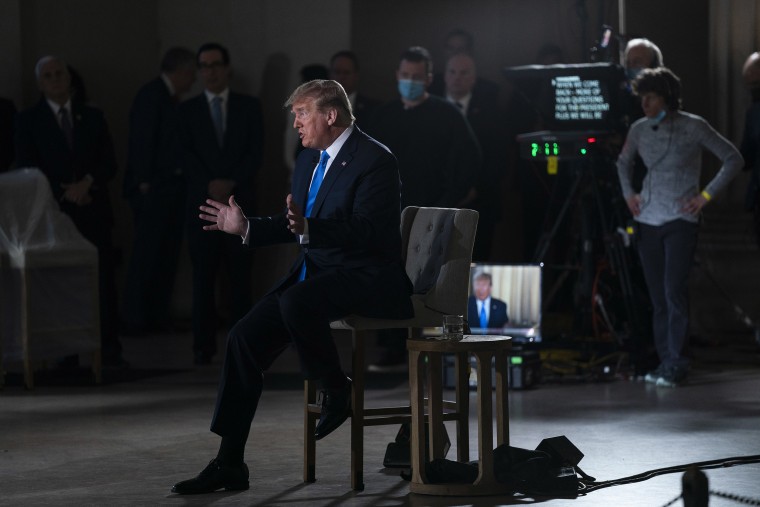There have been a variety of reports over the last month about the coronavirus warnings Donald Trump and his team received, but failed to heed, but last week's Washington Post report was arguably the most serious. It painted a picture of U.S. intelligence agencies issuing a series of warnings -- including notices in the President's Daily Brief -- in January and February, which the president failed to take seriously.
As we discussed the other day, the Post's report added that the PDB, which Trump reportedly does not often read, highlighted the growing viral threat; it raised doubts about the veracity of the claims from Chinese officials; and it warned of dire domestic consequences. What's more, the frequency with which the coronavirus was mentioned in the PDB "reflected a level of attention comparable to periods when analysts have been tracking active terrorism threats, overseas conflicts or other rapidly developing security issues."
During an Oval Office Q&A on Tuesday, a reporter asked Trump about the intelligence briefings he received in the early weeks of the year. The president's long, odd answer meandered a bit -- it even included a strange tale about House Speaker Nancy Pelosi -- before eventually concluding, "I'd have to check. I would have to check. I want to look as to the exact dates of warnings."
Evidently, we're supposed to believe that Trump has now checked and discovered how right he was all along. From a tweet he published yesterday afternoon:
"Intelligence has just reported to me that I was correct, and that they did NOT bring up the CoronaVirus subject matter until late into January... Also, they only spoke of the Virus in a very non-threatening, or matter of fact, manner."
Soon after, during his Lincoln Memorial event with Fox News, Trump echoed the point in response to a question about his intelligence briefings.
"On Jan. 23, I was told that there could be a virus coming in, but it was of no real import. In other words, it wasn't, 'Oh, we've got to do something, we've got to do something.' It was a brief conversation, and it was only on Jan. 23.... [Intelligence professionals] said it very matter-of-factly, and it was not a big deal."
Right off the bat, there's reason for skepticism about the president's version of events. According to the Post's reporting, for example, the warnings were far more serious than Trump suggested yesterday.
But taking a step further, it's hard not to see Trump's latest push as an effort to blame U.S. intelligence agencies for his administration's weak response. Confronted with questions about why the White House didn't act faster, the president's latest posture seems focused on the idea that intelligence professionals waited until late January to brief him, and even at that point they signaled to him that it was "not a big deal."
There's a long list of people, agencies, and entities Trump has blamed for his coronavirus response, and it's apparently grown just a bit longer.
Even if we were to accept this new explanation at face value -- and given the circumstances, that strikes me as unwise -- it would suggest the president believes there was a significant breakdown in intelligence, featuring an underwhelming warning about a severe public-health threat that didn't arrive at his desk until late January.
It leads to all sorts of related questions. Is Trump making this up? If not, and Trump's right about the intelligence community falling short, what does he intend to do about the failure?
Greg Sargent had a good piece along these lines this morning, making the case that congressional oversight can help provide some worthwhile answers. As Greg put it, "[N]ow that Trump has made this claim, such investigatory work by [House Intelligence Committee Chairman Adam Schiff] is critical. Democrats can indicate to the public -- without compromising classified information -- how urgent the warnings really were. If they were urgent -- and Trump is now lying about it -- we deserve to know. And if intelligence did underplay the threat, we deserve to know that, too."
